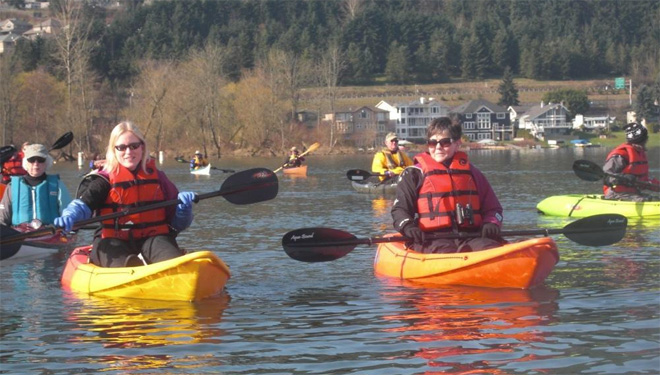Cold water can be deadly on warm weekend
by Rose Egge
SEATTLE, Wash. — With the state’s recent snow melt and few warm days so far this year, Wade Alonzo with Washington State Parks said the temperature of local rivers and lakes is still in the low 40s.
Most people will find these temperatures too cold for swimming, but Alonzo said he is concerned about people who unexpectedly end up in the water.
“If [boaters] capsize or they somehow fall overboard, they can be in trouble if they’re not prepared for the conditions,” Alonzo said.
Once a person is submerged in water that cold their body immediately goes into shock, said Elizabeth Bennett, a drowning prevention expert at Seattle Children’s Hospital.
“You take an involuntary gasp of air, and if you’re submerged you’re breathing in water,” she said.
Alonzo said the body starts to pull blood away from the limbs into the core after a few minutes, making it difficult to move.
“If you’re not wearing a life jacket going in, it’s going to be difficult to get one on once you’re in the water,” Alonzo said.
Tony Gomez, chair of Seattle-King County Drowning Prevention Coalition, was a life guard at Lake Sammamish and Snoqualmie River where he rescued swimmers who fell into cold water.
“As soon as they hit the water, they were in trouble,” Gomez said. “They were decent swimmers in a pool, but put them in cold water and they could only do a few strokes before they would get tired, start to panic and go under.”
If a person is in cold water for at least a minute hypothermia can set in, leading to permanent disability or death.
This is especially concerning for children, who often have a higher metabolism and can lose body heat faster said Dr. Mark Lo from the Seattle Children’s Emergency Medical Department.
“When they come out of the water get them warm and dry as soon as possible,” Lo said. “If they start to hallucinate or feel sleepy then they need to be seen by a medical professional quickly.”
Alonzo said consuming alcohol can also threaten boaters’ safety, especially since its affects are exaggerated in the sun and on the water. When a person is intoxicated they can also feel warmer than they actually are.
“Alcohol is going to impair your judgment, so you might not be making the best decisions of where to go, when to go,” Alonzo said.
Despite the risks, Alonzo said residents shouldn’t avoid boats or beaches this weekend. Instead he says they should be prepared to end up in the water. He recommended boaters always wear a life jacket, stay in a group with others who can help them out of the water, and pack extra dry clothes.
“We want people to get out on the water, but we want to do it safely,” Alonzo said. “Get a life jacket you like that fits well and wear it.”
Bennett said parents wearing their own life jackets can set a good example for their kids and help them be ready to rescue them at any moment.
“You need to be in arm’s length of your child at all times,” Bennett said. “A number of children who drown just wander away, and all of the sudden they’re out of sight. Be right there with no distractions.”
Alonzo said it is also important to make sure your boating activity is appropriate to your skill level.
The State Department of Health advises anyone planning a river activity to always check river levels and conditions before leaving home. Runoff from mountain snow and rain can create high, fast-moving water that can carry debris and increase drowning risks.
Source: KVAL.Com






